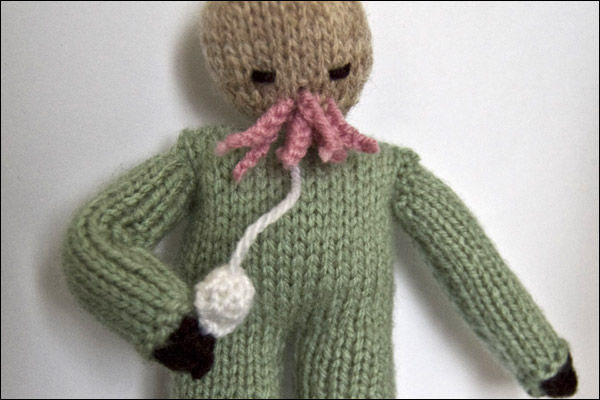BBC removes Doctor Who fan’s knitting patterns from the Web
 Update#2: The BBC have agreed to meet with Mazz and turn her knitted designs into, at the very least, a limited edition of exclusive promotional products. Apparently the production team love her works and can’t wait to get their own. Although we’re pleased with this outcome, intellectual property law is still in urgent need of reform and similar situations will continue to arise until this is addressed. The Government have agreed to look at the question and popular outcry over this story shows the urgency of the matter.
Update#2: The BBC have agreed to meet with Mazz and turn her knitted designs into, at the very least, a limited edition of exclusive promotional products. Apparently the production team love her works and can’t wait to get their own. Although we’re pleased with this outcome, intellectual property law is still in urgent need of reform and similar situations will continue to arise until this is addressed. The Government have agreed to look at the question and popular outcry over this story shows the urgency of the matter.
Update: Thanks to this article published by The Times today, the ORG phones have been buzzing all morning. BBC Worldwide have released a statement (copied in the comments below) and Mazz has updated her homepage to reflect what’s been going on. If you appreciate the work ORG does to raise the profile of digital rights issues like this one, please consider becoming an Open Rights Group supporter.
The Open Rights Group often receive calls from UK citizens who have found themselves on the wrong end of online copyright disputes. Because we’re not a legal advice service, very often we cannot offer them any help. We’re working on a way to change this situation – watch this space for an announcement in the Autumn. In the meantime we tend to pass these queries onto our informal law-discuss list for further analysis.
This week, Andres Guadamuz, who sits on the list, has published details of a very interesting dispute between the BBC and a knitting enthusiast and Doctor Who fan who goes by the screen name of Mazzmatazz. Mazz has been posting knitting patterns to help other people re-create characters from the cult series using only two sticks and ball of wool. Impressive? The BBC, producers of the series, didn’t think so. They sent Mazz a letter, which states:
“We note that you are supplying DR WHO items, and using trade marks and copyright owned by BBC. You have not been given permission to use the DR WHO brand and we ask that you remove from your site any designs connected with DR WHO. Please reply acknowledging receipt of this email, and confirm that you will remove the DR WHO items as requested.”
Fearing legal action, Mazz has now removed the knitting patterns from the Web.
As part of our response to OfCom’s public service broadcasting review, we’ll be making arguments similar to those we made last Summer during the iPlayer/DRM debate. That is, that in the future, organisations like the BBC with a public service remit should have a role in stimulating the creative economy in the UK, by allowing budding creators to remix its content. Even if this is only allowed to happen in a non-commercial context, the BBC could seed a new generation of creators and remixers, just as it nurtured a generation of computer games developers in the 1980s with its computer literacy project, centred around the iconic BBC micro.
This approach doesn’t mean giving all the BBC’s content away for free, although in some situations that might be appropriate. But it does mean being more flexible in the approach the BBC takes to controlling who gets to use its content and how. The approach the BBC have taken with Mazz’s knitting patterns demonstrate a distinct lack of flexibility. It is quite possible that through transforming the characters in Doctor Who into knitting patterns, Mazz may have infringed upon the BBC’s copyright. But it’s hard to see how Mazz’s non-commercial knitting patterns actually damage the commercial interests of the BBC.
The situation also touches on the growing need for UK copyright law to allow transformative use of works. In 2006, the Gowers Review of Intellectual Property asked the UK Intellectual Property Office to propose amendments to the European Copyright Directive that allowed for creative, transformative or derivative works. In ORG’s recent submission to the UK IPO, we urged the UK IPO to take this recommendation forward. For a compelling legal analysis of the issues that Mazz’s sitaution touches upon, including the tricky area of transformative use of works, visit Andres’s blog, Technollama.
